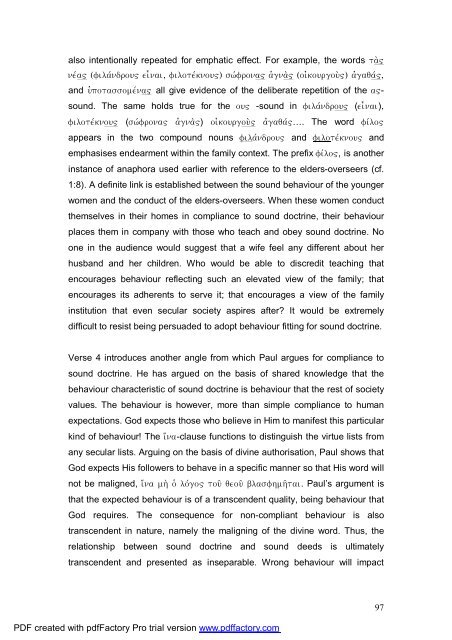A Text centred rhetorical analysis of Paul's Letter to Titus
A Text centred rhetorical analysis of Paul's Letter to Titus
A Text centred rhetorical analysis of Paul's Letter to Titus
Create successful ePaper yourself
Turn your PDF publications into a flip-book with our unique Google optimized e-Paper software.
also intentionally repeated for emphatic effect. For example, the words ta;"<br />
neva" (filavndrou" ei\nai, filotevknou") swvfrona" aJgna;" (oijkourgou;") ajgaqav",<br />
and uJpotassomevna" all give evidence <strong>of</strong> the deliberate repetition <strong>of</strong> the a"-<br />
sound. The same holds true for the ou~ -sound in filavndrou" (ei\nai),<br />
filotevknou" (swvfrona" aJgna;") oijkourgou;" ajgaqav"…. The word fivlo~<br />
appears in the two compound nouns filavndrou" and filotevknou" and<br />
emphasises endearment within the family context. The prefix fivlo~, is another<br />
instance <strong>of</strong> anaphora used earlier with reference <strong>to</strong> the elders-overseers (cf.<br />
1:8). A definite link is established between the sound behaviour <strong>of</strong> the younger<br />
women and the conduct <strong>of</strong> the elders-overseers. When these women conduct<br />
themselves in their homes in compliance <strong>to</strong> sound doctrine, their behaviour<br />
places them in company with those who teach and obey sound doctrine. No<br />
one in the audience would suggest that a wife feel any different about her<br />
husband and her children. Who would be able <strong>to</strong> discredit teaching that<br />
encourages behaviour reflecting such an elevated view <strong>of</strong> the family; that<br />
encourages its adherents <strong>to</strong> serve it; that encourages a view <strong>of</strong> the family<br />
institution that even secular society aspires after? It would be extremely<br />
difficult <strong>to</strong> resist being persuaded <strong>to</strong> adopt behaviour fitting for sound doctrine.<br />
Verse 4 introduces another angle from which Paul argues for compliance <strong>to</strong><br />
sound doctrine. He has argued on the basis <strong>of</strong> shared knowledge that the<br />
behaviour characteristic <strong>of</strong> sound doctrine is behaviour that the rest <strong>of</strong> society<br />
values. The behaviour is however, more than simple compliance <strong>to</strong> human<br />
expectations. God expects those who believe in Him <strong>to</strong> manifest this particular<br />
kind <strong>of</strong> behaviour! The i{na-clause functions <strong>to</strong> distinguish the virtue lists from<br />
any secular lists. Arguing on the basis <strong>of</strong> divine authorisation, Paul shows that<br />
God expects His followers <strong>to</strong> behave in a specific manner so that His word will<br />
not be maligned, i{na mh; oJ lovgo" <strong>to</strong>u` qeou` blasfhmh`tai. Paul’s argument is<br />
that the expected behaviour is <strong>of</strong> a transcendent quality, being behaviour that<br />
God requires. The consequence for non-compliant behaviour is also<br />
transcendent in nature, namely the maligning <strong>of</strong> the divine word. Thus, the<br />
relationship between sound doctrine and sound deeds is ultimately<br />
transcendent and presented as inseparable. Wrong behaviour will impact<br />
PDF created with pdfFac<strong>to</strong>ry Pro trial version www.pdffac<strong>to</strong>ry.com<br />
97

















